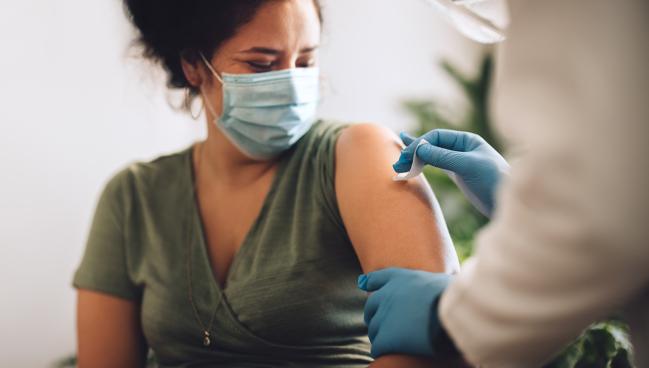COVID-19 Vaccination Tied to Fewer CV Events in Large UK Study
Though rare complications were confirmed, the study supports the net benefit of immunization—particularly for CVD patients.

Through one, two, or three doses of COVID-19 vaccine, people who receive the shots generally see lower risks of overall arterial and venous thrombotic events, according to a study of nearly 46 million people living in England.
The incidence of major events like acute MI, acute ischemic stroke, pulmonary embolism, and deep venous thrombosis was either similar or lower after receipt of one of the three vaccines used during the first 2 years of the pandemic in the United Kingdom compared with before or without the shot.
The differences in risk were mostly larger after the second and booster doses than after the initial dose of each of the vaccines, researchers led by Samantha Ip, PhD (University of Cambridge, England), report in a their paper published online this week in Nature Communications, show.
The researchers also confirmed the rarity of some complications that emerged as the world rolled out COVID-19 vaccines in late 2020 and early 2021—including vaccine-induced immune thrombotic thrombocytopenia (VITT) after use of the adenovirus-based Oxford/AstraZeneca (ChAdOx1) shot and myocarditis and pericarditis after use of the mRNA-based vaccines from Pfizer/BioNTech (BNT-162b2) and Moderna (mRNA-1273).
“These findings, in conjunction with the long-term higher risk of severe cardiovascular and other complications associated with COVID-19, offer compelling evidence supporting the net cardiovascular benefit of COVID vaccination,” they write.
Co-author William Whiteley, BM BCh, PhD (University of Edinburgh, Scotland), said these data wouldn’t change the overall public health message around the importance of getting vaccinated against COVID-19. He added, however, that “if I was going to use these in any way to change [that messaging], it would be to emphasize that people who are at high risk for cardiovascular disease, it’s particularly important for those people to be vaccinated because this is as well as other lines of evidence suggest that being vaccinated against annual common viruses reduces your risk of having further heart attacks and strokes.”
The Impact of Boosters
Initial doses of COVID-19 vaccine were associated with reductions in cardiovascular events, albeit with some rare complications, but there has been less information available on what happened after subsequent doses—ie, completion of the primary series and receipt of boosters.
To address that question, Ip, Whiteley, and other researchers from the CVD-COVID-UK/COVID-IMPACT Consortium and the Longitudinal Health and Wellbeing COVID-19 National Core Study examined electronic health records from 45.7 million adults (51% women) who were living in England on December 8, 2020 (the start of the UK vaccine rollout) and who had information available through January 2022.
The investigators compared the incidence of cardiovascular complications up to 26 weeks after first, second, and booster doses of the Oxford/AstraZeneca, Pfizer/BioNTech, and Moderna vaccines with the incidence before vaccination or in the absence of the corresponding shot.
This is as well as other lines of evidence suggest that being vaccinated against annual common viruses reduces your risk of having further heart attacks and strokes. William Whiteley
In general, rates of arterial thrombotic events, which were mostly acute MI and ischemic stroke, were similar or lower after each vaccine dose compared with no vaccination, with greater differences in favor of immunization with each subsequent shot.
For example, the hazard ratio for such events 13 to 24 weeks after the first dose was 0.99 (95% CI 0.97-1.02) with the Oxford/AstraZeneca vaccine and 0.90 (95% CI 0.88-0.93) with the Pfizer/BioNTech shot. After the second doses, the respective HRs were 0.73 (95% CI 0.70-0.76) and 0.80 (95% CI 0.77-0.83).
After a primary course of Oxford/AstraZeneca vaccine, mRNA-based booster doses were associated with larger reductions in risk—HR 0.71 (95% CI 0.66-0.76) at 13 to 24 weeks after the Pfizer/BioNTech shot and 0.67 (95% CI 0.62-0.72) at 5 to 24 weeks after the Moderna shot. And after a primary course of Pfizer/BioNTech vaccine, the risk of arterial thrombotic events 13 to 24 weeks after a booster dose was significantly lower with an additional Pfizer/BioNTech shot (HR 0.73; 95% CI 0.69-0.77) but not with the Moderna shot (HR 1.21; 95% CI 0.38-3.86).
Rates of venous thrombotic events—mainly pulmonary embolism and lower-limb deep venous thrombosis—followed a similar pattern, with greater differences in risk favoring vaccination after the second and booster doses.
Complications remained rare, but there were higher rates of VITT leading to intracranial venous thrombosis and thrombocytopenia observed after a first dose of Oxford/AstraZeneca vaccine, with the highest risk seen in the first 2 weeks, and of myocarditis and pericarditis after use of the mRNA-based shots.
The results were mostly similar across subgroups defined by age, sex, ethnicity, prior history of COVID-19, and previous arterial and thrombotic events.
Although the study is subject to the limitations of an observational analysis, the authors say it “offers reassurance regarding the cardiovascular safety of COVID-19 vaccines, with lower incidence of common cardiovascular events outweighing the higher incidence of their known rare cardiovascular complications. We found no novel cardiovascular complications or new associations with subsequent doses.”
Importantly, Whiteley said, “all vaccines seem to reduce the incidence of major cardiovascular disorders. So whilst people have been concentrating on these rare complications, of course the important public health problem are the common diseases like heart attack, ischemic stroke, deep vein thrombosis, and pulmonary embolism, which were reduced with vaccination, which we think is due to its effect on preventing COVID.”
Easing Fears Among Patients
Gregory Piazza, MD (Brigham and Women’s Hospital, Boston, MA), a member of the American College of Cardiology’s Vascular Disease Section, said this is a helpful study, with its large size providing more confidence in the assessments of safety and potential clinical impact.
“Being able to show a reduction in cardiovascular events and also that these are safe vaccinations should help to allay some of the fears that folks might have about whether this is safe for me to get but also if I get really sick from COVID, I have the potential to be protected because I’ve been vaccinated,” commented to TCTMD. “So hopefully this provides information [not only] for future surges of COVID-19 but also for vaccination programs in future pandemics—if you believe the literature, we will eventually be dealing with other pandemics.”
Being able to show a reduction in cardiovascular events and also that these are safe vaccinations should help to allay some of the fears that folks might have. Gregory Piazza
The findings change Piazza’s assessment on the safety of the COVID-19 vaccines in a positive way, he said. “I can speak with more confidence when I talk to my patients. . . . This provides a reason for me as a cardiovascular specialist to endorse ongoing vaccination.”
Shared decision-making discussions include consideration of the rare complications, which are outweighed by the benefits seen with vaccination, Piazza said, noting that getting vaccinated is particularly important in his patients, who largely have cardiovascular disease. “I can give them that information that this is something that can help to reduce their risk when it’s probably higher than the general population.”
He had a research-related take-home message as well. Analyses of large datasets like this one take a lot of effort, but “more nations, more healthcare programs should be looking to do similar studies when there’s this question or hesitancy about adopting public health measures like a vaccination program. Granted it has its limitations, but this is a nice way of addressing concerns about safety, but also confirming potential benefits. It’d be nice to see more of these types of studies in the future,” Piazza suggested.
Whiteley, too, underscored the importance of using large, population-level datasets to confirm prior findings and encouraged researchers to develop the means to perform such studies to support public health efforts.
Todd Neale is the Associate News Editor for TCTMD and a Senior Medical Journalist. He got his start in journalism at …
Read Full BioSources
Ip S, North T-L, Torabi F, et al. Cohort study of cardiovascular safety of different COVID-19 vaccination doses among 46 million adults in England. Nat Commun. 2024;15(1):6085.
Disclosures
- Whiteley reports being supported by the Chief Scientists Office and Stroke Association and having given expert testimony to UK courts.
- Ip and Piazza report no relevant conflicts of interest.






Comments